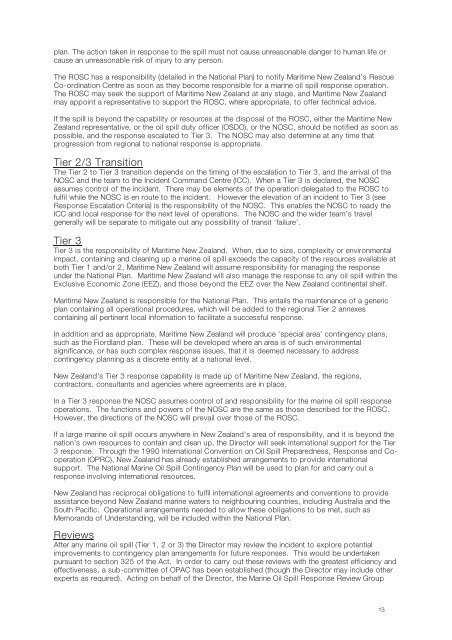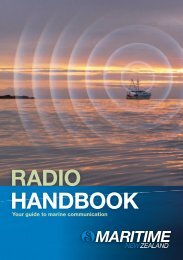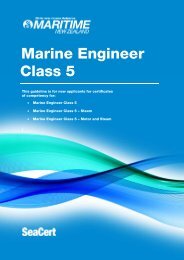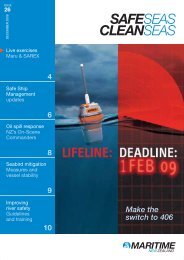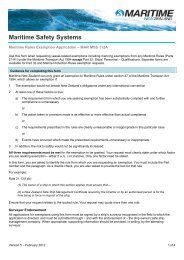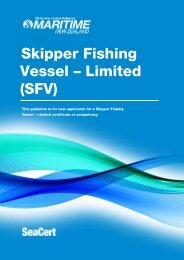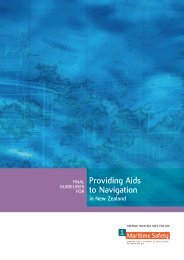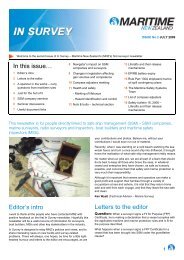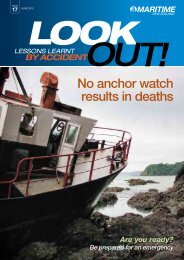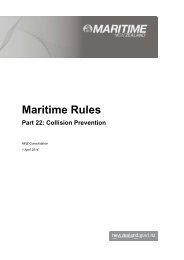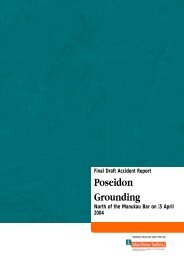New Zealand oil spill response strategy - Maritime New Zealand
New Zealand oil spill response strategy - Maritime New Zealand
New Zealand oil spill response strategy - Maritime New Zealand
Create successful ePaper yourself
Turn your PDF publications into a flip-book with our unique Google optimized e-Paper software.
plan. The action taken in <strong>response</strong> to the <strong>spill</strong> must not cause unreasonable danger to human life or<br />
cause an unreasonable risk of injury to any person.<br />
The ROSC has a responsibility (detailed in the National Plan) to notify <strong>Maritime</strong> <strong>New</strong> <strong>Zealand</strong>’s Rescue<br />
Co-ordination Centre as soon as they become responsible for a marine <strong>oil</strong> <strong>spill</strong> <strong>response</strong> operation.<br />
The ROSC may seek the support of <strong>Maritime</strong> <strong>New</strong> <strong>Zealand</strong> at any stage, and <strong>Maritime</strong> <strong>New</strong> <strong>Zealand</strong><br />
may appoint a representative to support the ROSC, where appropriate, to offer technical advice.<br />
If the <strong>spill</strong> is beyond the capability or resources at the disposal of the ROSC, either the <strong>Maritime</strong> <strong>New</strong><br />
<strong>Zealand</strong> representative, or the <strong>oil</strong> <strong>spill</strong> duty officer (OSDO), or the NOSC, should be notified as soon as<br />
possible, and the <strong>response</strong> escalated to Tier 3. The NOSC may also determine at any time that<br />
progression from regional to national <strong>response</strong> is appropriate.<br />
Tier 2/3 Transition<br />
The Tier 2 to Tier 3 transition depends on the timing of the escalation to Tier 3, and the arrival of the<br />
NOSC and the team to the Incident Command Centre (ICC). When a Tier 3 is declared, the NOSC<br />
assumes control of the incident. There may be elements of the operation delegated to the ROSC to<br />
fulfil while the NOSC is en route to the incident. However the elevation of an incident to Tier 3 (see<br />
Response Escalation Criteria) is the responsibility of the NOSC. This enables the NOSC to ready the<br />
ICC and local <strong>response</strong> for the next level of operations. The NOSC and the wider team’s travel<br />
generally will be separate to mitigate out any possibility of transit ‘failure’.<br />
Tier 3<br />
Tier 3 is the responsibility of <strong>Maritime</strong> <strong>New</strong> <strong>Zealand</strong>. When, due to size, complexity or environmental<br />
impact, containing and cleaning up a marine <strong>oil</strong> <strong>spill</strong> exceeds the capacity of the resources available at<br />
both Tier 1 and/or 2, <strong>Maritime</strong> <strong>New</strong> <strong>Zealand</strong> will assume responsibility for managing the <strong>response</strong><br />
under the National Plan. <strong>Maritime</strong> <strong>New</strong> <strong>Zealand</strong> will also manage the <strong>response</strong> to any <strong>oil</strong> <strong>spill</strong> within the<br />
Exclusive Economic Zone (EEZ), and those beyond the EEZ over the <strong>New</strong> <strong>Zealand</strong> continental shelf.<br />
<strong>Maritime</strong> <strong>New</strong> <strong>Zealand</strong> is responsible for the National Plan. This entails the maintenance of a generic<br />
plan containing all operational procedures, which will be added to the regional Tier 2 annexes<br />
containing all pertinent local information to facilitate a successful <strong>response</strong>.<br />
In addition and as appropriate, <strong>Maritime</strong> <strong>New</strong> <strong>Zealand</strong> will produce ‘special area’ contingency plans,<br />
such as the Fiordland plan. These will be developed where an area is of such environmental<br />
significance, or has such complex <strong>response</strong> issues, that it is deemed necessary to address<br />
contingency planning as a discrete entity at a national level.<br />
<strong>New</strong> <strong>Zealand</strong>'s Tier 3 <strong>response</strong> capability is made up of <strong>Maritime</strong> <strong>New</strong> <strong>Zealand</strong>, the regions,<br />
contractors, consultants and agencies where agreements are in place.<br />
In a Tier 3 <strong>response</strong> the NOSC assumes control of and responsibility for the marine <strong>oil</strong> <strong>spill</strong> <strong>response</strong><br />
operations. The functions and powers of the NOSC are the same as those described for the ROSC.<br />
However, the directions of the NOSC will prevail over those of the ROSC.<br />
If a large marine <strong>oil</strong> <strong>spill</strong> occurs anywhere in <strong>New</strong> <strong>Zealand</strong>’s area of responsibility, and it is beyond the<br />
nation’s own resources to contain and clean up, the Director will seek international support for the Tier<br />
3 <strong>response</strong>. Through the 1990 International Convention on Oil Spill Preparedness, Response and Cooperation<br />
(OPRC), <strong>New</strong> <strong>Zealand</strong> has already established arrangements to provide international<br />
support. The National Marine Oil Spill Contingency Plan will be used to plan for and carry out a<br />
<strong>response</strong> involving international resources.<br />
<strong>New</strong> <strong>Zealand</strong> has reciprocal obligations to fulfil international agreements and conventions to provide<br />
assistance beyond <strong>New</strong> <strong>Zealand</strong> marine waters to neighbouring countries, including Australia and the<br />
South Pacific. Operational arrangements needed to allow these obligations to be met, such as<br />
Memoranda of Understanding, will be included within the National Plan.<br />
Reviews<br />
After any marine <strong>oil</strong> <strong>spill</strong> (Tier 1, 2 or 3) the Director may review the incident to explore potential<br />
improvements to contingency plan arrangements for future <strong>response</strong>s. This would be undertaken<br />
pursuant to section 325 of the Act. In order to carry out these reviews with the greatest efficiency and<br />
effectiveness, a sub-committee of OPAC has been established (though the Director may include other<br />
experts as required). Acting on behalf of the Director, the Marine Oil Spill Response Review Group<br />
13


